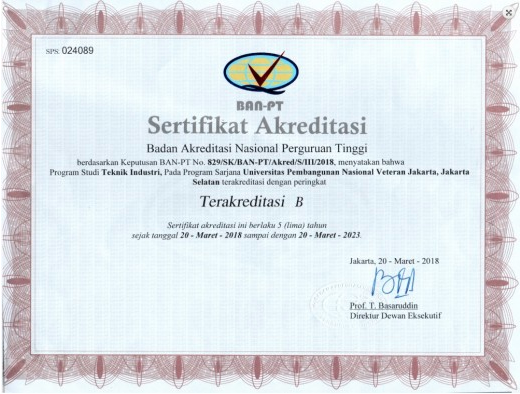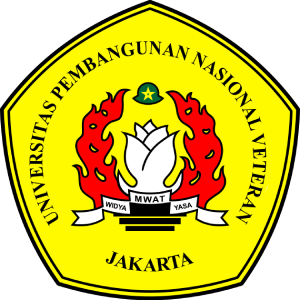Program Studi S-1 Teknik Industri

Vision
In 2025, it will become a superior study program at the regional level in the field of industrial technology that is innovative and has a competitive edge and has the character of State Defense.
Mision
- Organizing Industrial Engineering education that is relevant to the needs of industry and society to produce graduates who are superior, innovative and have national defense characteristics.
- Carrying out quality research and community service in the field of Industrial Engineering and contributing to the advancement of science and technology as well as increasing competitiveness
- Carrying out transparent, accountable and quality institutional governance in a sustainable manner.
Produce a qualified Bachelor of Industrial Engineering as follows:
- Able to apply mathematics, science, and engineering principles to solve complex engineering problems in integrated systems including humans, materials, equipment, energy and information.
- Able to identify, formulate, and analyze complex engineering problems in an integrated system based on analytical, computational, or experimental approaches by taking into account economic, health and public safety, cultural, social and environmental factors (environmental consideration).
- Able to behave with the identity of defending the country
Produce:
- Graduates with a minimum cumulative achievement index (GPA) of 3.00 with a study period of 8 semesters and have a minimum Test of English as a Foreign Language (TOEFL) score of 405.
- Minimum research is 1 per lecturer per semester.
- Community service at least 1 per year
Competencies of Graduates of S-1 Industrial Engineering
PROFILE OF GRADUATES OF BACHELOR PROGRAMS ACCORDING TO KKNI LEVEL 6
MAIN COMPETENCIES OF PSTI GRADUATES:
1. Able to design an integrated system in accordance with the applicable technical, safety and environmental health standards by considering aspects of performance and reliability, ease of implementation and sustainability, as well as taking into account economic, social and cultural factors.
1.1 The ability to design work stations and work environments in accordance with ergonomic and work system design principles.
1.2 The ability to use ergonomic principles to evaluate the design of a product.
1.3 Ability to make cross-assembly designs and evaluate their performance.
1.4 The ability to design facility layout for production and non-production for a product with a predetermined capacity size.
1.5 Ability to create simple information systems from designed business processes.
2. Able to research and investigate complex engineering problems in integrated systems using basic engineering principles and by carrying out research, analysis, data interpretation and information synthesis to provide solutions.
2.1 The ability to determine variables and parameters and their relationships in an integrated system problem.
2.2 The ability to determine the appropriate research methods to solve industrial engineering problems
2.3 Ability to collect data with appropriate sampling methods.
2.4 The ability to perform data processing and analysis with appropriate statistical techniques.
2.5 Ability to design and run experiments to solve industrial engineering problems.
3. Mastering the principles and techniques of integrated system design with a systems approach.
3.1 Understand the design process as a basic feature of the engineering discipline
3.2 Understand the definition, scope, problems and the Industrial Engineering profession
3.3 Understand Industrial Engineering approaches in solving problems.
3.4 Understanding the concept of work, work systems and their roles in increasing efficiency and productivity.
3.5 Understand basic knowledge and have decision-making concept skills in the selection of technical design alternatives (investment plans) based on economic considerations.
4. Able to behave with the identity of State Defense.
COMPETENCY OF PSTI GRADUATE SUPPORT:
- Able to apply mathematics, science, and engineering principles to solve complex engineering problems in integrated systems (including humans, materials, equipment, energy, and information).
- Able to identify, formulate, and analyze complex engineering problems in integrated systems based on analytical, computational, or experimental approaches.
- Able to formulate solutions to complex engineering problems in integrated systems by taking into account economic, health, and public safety, cultural, social and environmental factors. (environmental consideration).
- Have the ability to develop themselves, be able to think logically and analyze in solving problems faced.
- Able to communicate orally and in writing in Indonesian and English, and able to work in groups
OTHER COMPETENCIES / PSTI GRADUATES OPTIONS
- Mastering knowledge of the latest and latest technological developments and communication techniques.
- Have the ability in entrepreneurship as well as creative and innovative.
- Have leadership, management and financial skills.
- Able to work in various types of industries, namely the service industry, manufacturing industry and process industry.

